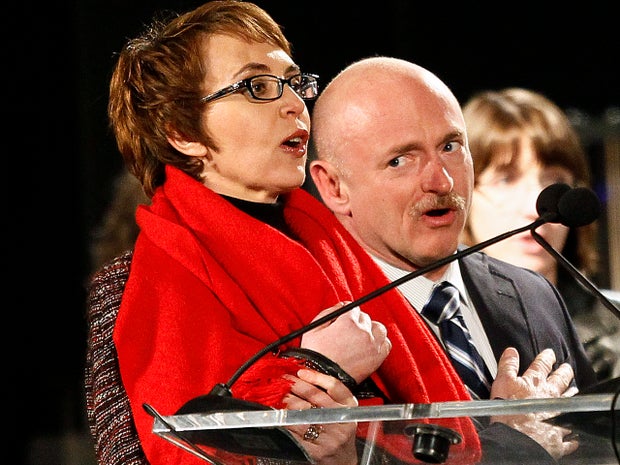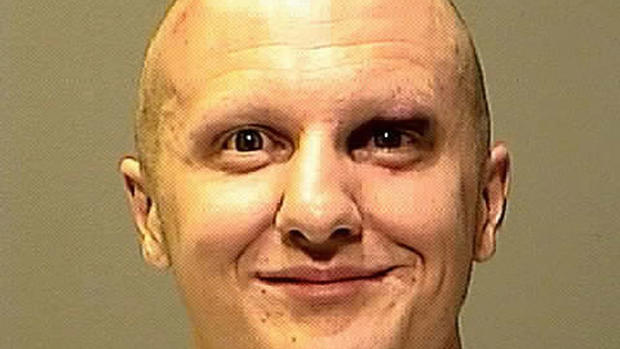Giffords satisfied with Loughner plea, says former congresswoman's husband
Updated at 3:26 p.m. ET
(CBS/AP) TUCSON, Ariz. - The husband of former Arizona Rep. Gabrielle Giffords says he and his wife are satisfied with a plea agreement for the suspect in the Tucson mass shooting.
"We don't speak for all of the victims or their families, but Gabby and I are satisfied with this plea agreement. The pain and loss caused by the events of January 8, 2011 are incalculable. Avoiding a trial will allow us -- and we hope the whole Southern Arizona community -- to continue with our recovery and move forward with our lives," Mark Kelly wrote in a statement.
Jared Loughner is scheduled for a change of plea hearing in federal court Tuesday. He will be asked to acknowledge that he shot and killed six people and wounded 13 others, including Giffords.
Loughner's attorneys and prosecutors also will try to persuade U.S. District Court Judge Larry A. Burns that Loughner no longer is mentally unfit for trial. A lot will depend on how Loughner behaves in Court Tuesday.
Experts had concluded that Loughner suffers from schizophrenia, and officials at a federal prison have forcibly medicated him with psychotropic drugs for more than a year.
A court-appointed psychiatrist is expected to testify Tuesday that he is competent to enter a plea.
Survivors of the shooting will be in court and many wonder which Jared Loughner will show up - the one made more coherent through heavy medication, or the angry, rambling Loughner who destroyed so many lives, CBS News correspondent Bill Whitaker reports.
On "CBS This Morning," CBS News legal analyst Jack Ford said the standard for competency to stand trial that Loughner faces, which is different from what his mental state was at the time of the shooting, is whether he understands the charges against him.
"Do you realize why you're there? And can you assist in your defense?" said Ford. "Can you help your lawyer when your lawyer says 'OK, do you remember what you were doing at the time? What witnesses can we get?'
"So it's a very limited threshold standard, important in terms of a trial, but in some ways, it might have nothing to do with the issue of whether you were actually criminally insane at the time that the act took place."
If Burns agrees, as legal experts expect, a formal change-of-plea hearing will follow. That's when those in the court will hear from Loughner at length for the first time, as the judge questions him about the agreement and changing his plea to guilty.
Burns may ask Loughner to recite his actions in his own words, but either his lawyer or the federal prosecutor could just read the facts of the January 2011 shooting spree at a Tucson supermarket, where then-Rep. Gabrielle Giffords was holding a meet-and-greet with constituents.
Either way, Loughner will be asked to acknowledge that he shot and killed six people, including the top federal judge in Arizona, and wounded 13 others, including Giffords. He'll need to convince Burns he understands what is going on, what he's doing and what he did.
Still, Loughner could break down, change his mind about pleading guilty or show so little understanding of what he's doing that Burns rejects the plea, lawyers not involved in the case said Monday.
Medicated Jared Loughner set to plead guilty
Giffords leads vigil on shooting anniversary
One year later, Tucson itself still healing too
"The fact that there is this planned change of plea is no guarantee that it will go forward," said Paul Charlton, a former U.S. attorney for Arizona. "There are any number of things that would happen that would either cause it to be removed from the calendar or not go forward at all."
The plea agreement that is expected to be made public on Tuesday would see Loughner sentenced to life in prison, taking the possibility of the death penalty off the table in the federal case, a person familiar with the case told The Associated Press on Saturday. The person was not authorized to discuss the case publicly and spoke on condition of anonymity.
An agreement that would spare Loughner the death penalty offers something for both sides, said Quin Denvir, a California defense attorney who has worked with Loughner attorney Judy Clarke on the case against Ted Kaczynski.
Prosecutors would avoid a potentially lengthy and costly trial and appeal, knowing that the defendant will be locked up for life. Clarke managed to avoid the death penalty for other high-profile clients such as Kaczynski and Eric Rudolph, who bombed abortion clinics in the late 1990s and Atlanta's Olympic park in 1996.
News of an agreement hasn't brought negative reaction from victims' families, and some said they support the government's decision.
The top prosecutor in southern Arizona's Pima County said last year that she may file state charges in the case that could carry the death penalty. An official in the prosecutor's office, Amelia Craig Cramer, declined to comment, saying the office did not have an active prosecution against Loughner.
Denvir said it was possible that the plea agreement calls for the state to avoid pursuing criminal charges against Loughner, though that's not a given.
"Ideally (as a defense attorney) you'd like to have it resolved all at once, but sometimes you have to take one at a time," he said.
The decision to spare Loughner a federal death sentence makes sense, said Dale Baich, a federal public defender in Phoenix who handles capital case appeals and isn't involved in the case.
"As time went on and there were numerous evaluations, I think everybody had a better understanding of Mr. Loughner's mental illness." Baich said.
He added: "It appears that he will need to be treated for the rest of his life in order to remain competent."

